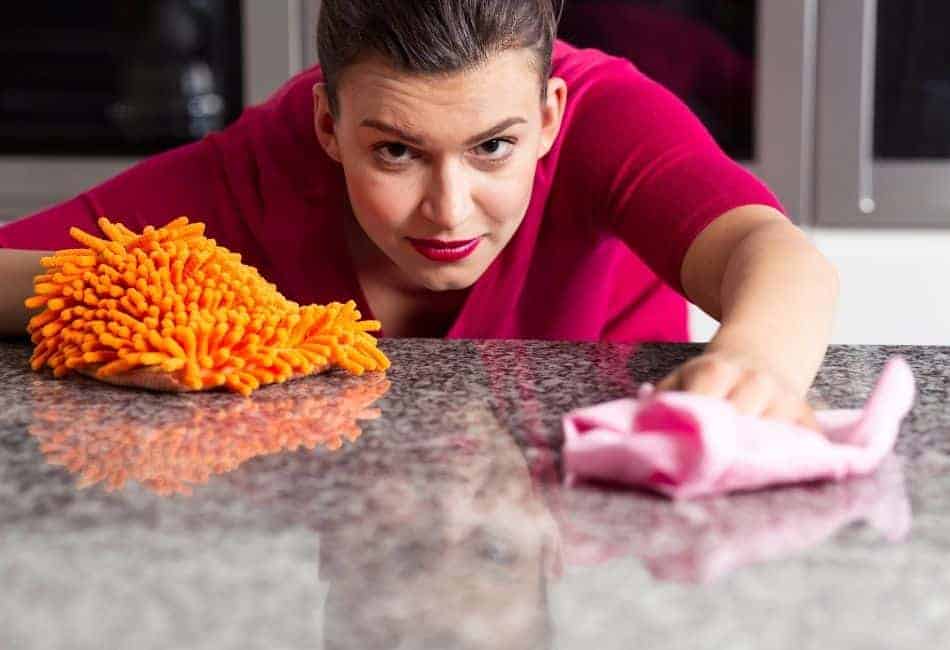If you’re like most people, you probably don’t think twice about using oven cleaner on your kitchen countertops. After all, it’s designed to clean ovens, so it must be safe to use on other surfaces, right? Wrong. You may be doing more harm than good. Oven cleaners are actually very damaging to kitchen countertops and can cause a host of problems, from etching to discoloration. If you’ve already used oven cleaner on your kitchen countertops, don’t worry there are ways to fix the damage. In this article, we will discuss the effects of oven cleaners on different types of kitchen countertops and what to do if you have already damaged your kitchen countertops with an oven cleaner. We will also provide tips on how best you can clean your kitchen countertops without using harsh chemicals.
Why Do Oven Cleaners Damage Kitchen Countertops?
Oven cleaners are designed to remove tough, baked-on stains and deposits from ovens. Ovens are open to grease and grime, so they need to be cleaned with a powerful cleaner. Kitchen countertops, on the other hand, are not exposed to the same kind of grease and grime. As a result, they don’t need to be cleaned with such harsh chemicals.
There are two main types of oven cleaners: caustic and corrosive. Caustic oven cleaners contain Lye (sodium hydroxide), which is a strong alkali. This type of cleaner can cause etching on glass and ceramic surfaces. Corrosive oven cleaners contain sulfuric acid, which is even more damaging than sodium hydroxide. These cleaners can cause discoloration, staining, pitting, and other types of damage to kitchen countertops.
What Happens if You Use Oven Cleaner on Kitchen Countertops?
If you use oven cleaner on kitchen countertops, you may notice itching, discoloration, or other types of damage. The severity of the damage will depend on the type of kitchen countertop material and the amount of time that the oven cleaner is left on the surface. In some cases, the damage may be permanent.
Let’s look at some of the effects of oven cleaners on different kitchen countertop materials.
Effect of Oven Cleaners on Wood Kitchen Countertops
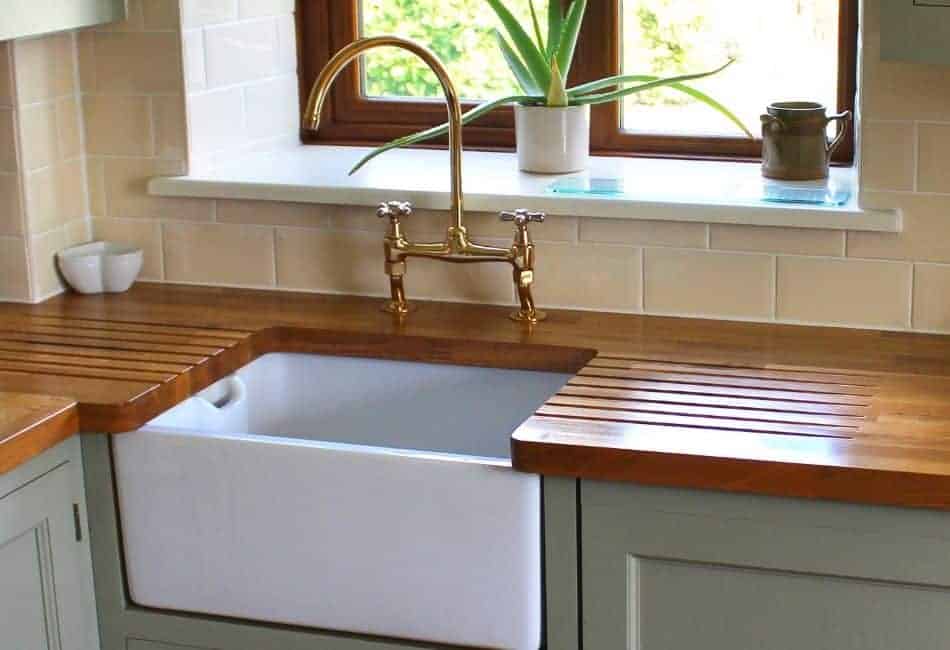
Wooden kitchen countertops have a porous surface that can easily be stained and damaged by oven cleaners. Wood finishings protect wood countertops from water damage, heat damage, and stains. Without any finishing, wood countertops are more susceptible to damage. The chemicals in oven cleaners will strip the finish from the wood, leaving it dull and unprotected.
Effect of Oven Cleaners on Marble Kitchen Countertops
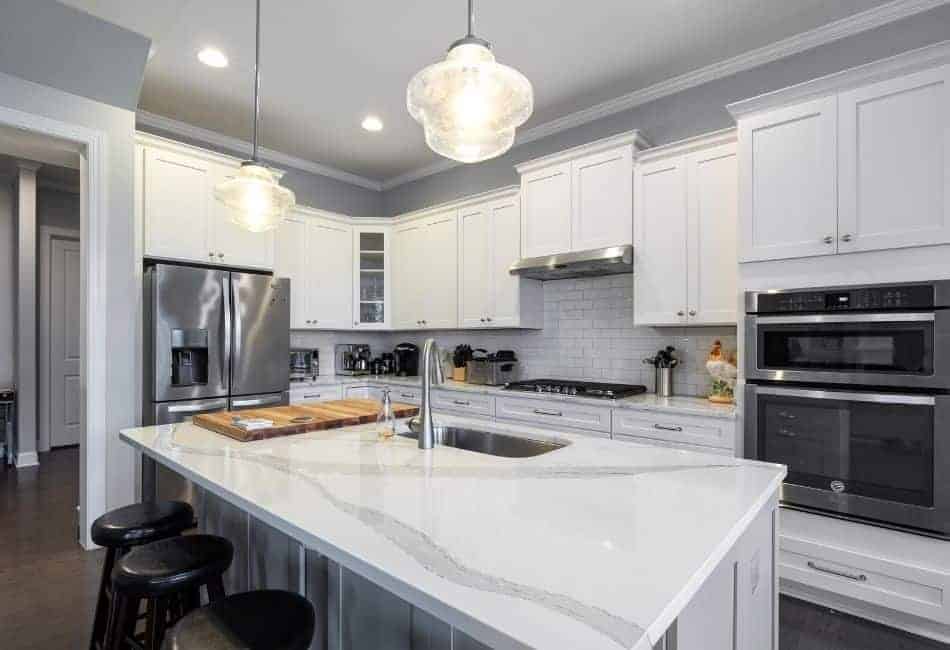
Marble is a very porous natural stone. This means that it can easily be stained by spills and other liquids. Oven cleaners contain harsh chemicals that can etch the surface of marble countertops, making them dull and uneven. In some cases, the chemicals can even cause the marble to break down and crumble.
Effect of Oven Cleaners on Granite Kitchen Countertops
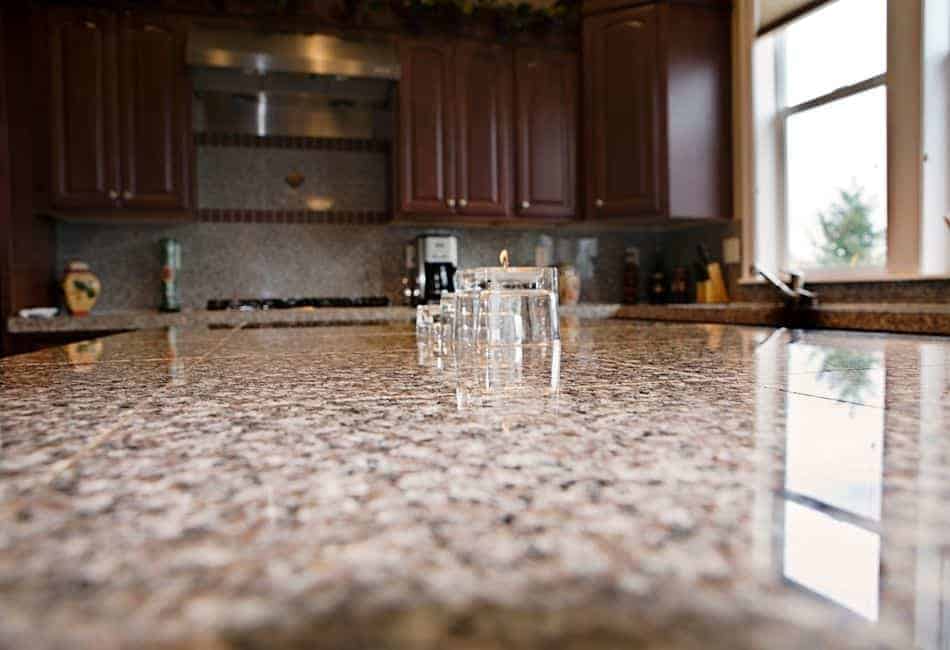
Granite is a very durable countertop material, but it is not immune to damage from oven cleaners. The chemicals in oven cleaners can eat away at the sealant that protects granite countertops, leaving them vulnerable to staining and discoloration.
Effect of Oven Cleaners on Quartz Kitchen Countertops

Quartz is one of the most durable countertop materials, but it can still be damaged by oven cleaners. This kitchen countertop is put together with resin to form a solid slab and pigment is added during the process to give it color. When it is exposed to harsh oven cleaners, the chemicals can break down the resin, causing the quartz to become dull and discolored.
Effect of Oven Cleaners on Laminate Kitchen Countertops
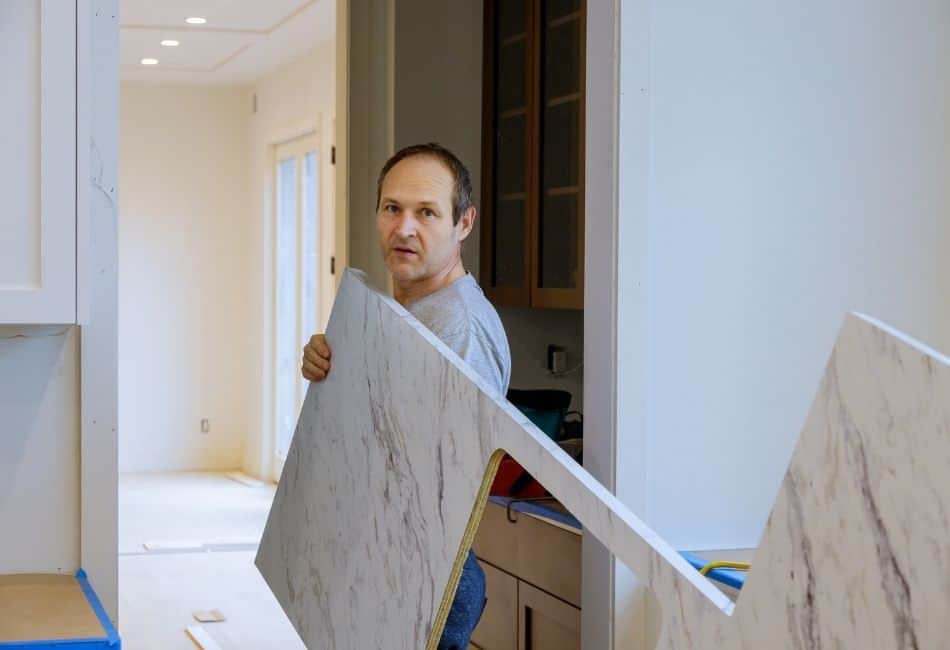
Laminate countertops are made of a thin layer of plastic that is bonded to a wood substrate. Laminate is not as durable as other countertop materials, and it can be easily damaged by oven cleaners. The chemicals in oven cleaners can dissolve the plastic layer, leaving the wood substrate exposed.
Effect of Oven Cleaners on Tile Kitchen Countertops
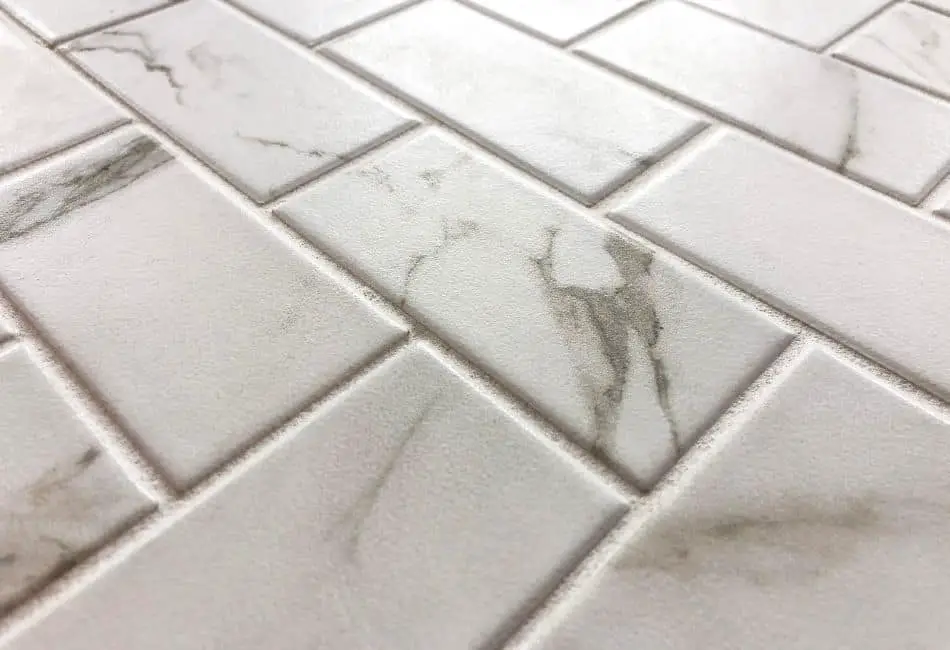
Tile is a very durable countertop material, but it is not immune to damage from oven cleaners. Tiled kitchen countertops are not very common as compared to the other types. Sometimes cleaning the grout lines can prove difficult and you might think using an oven cleaner could help get the job done. What you don’t see is that the chemicals in the oven cleaner are slowly eating away at the grout, causing it to become discolored and eroded.
Effect of Oven Cleaners on Stainless Steel Kitchen Countertops
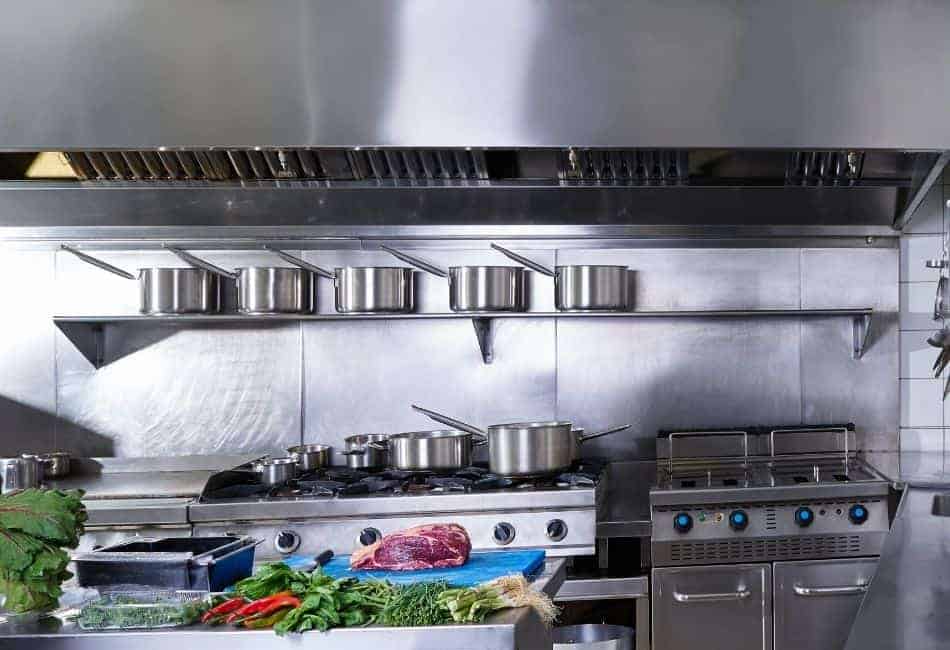
Stainless steel kitchen countertops are common in commercial kitchens because they are durable and easy to clean. However, oven cleaners can damage the finish of stainless steel countertops, making them dull and uneven. In some cases, the chemicals in oven cleaners can even cause rust to form on the surface of stainless steel countertops.
So, what should you do if you accidentally use oven cleaner on your kitchen countertop?
What to Do You Use Oven Cleaners On Kitchen Countertop
If you accidentally, unknowingly, or intentionally use oven cleaner on your kitchen countertop, don’t panic. There are some things you can do to try and salvage the situation.
- The first thing you need to do is to rinse the area with warm water as soon as possible. This will help to remove any residual cleaner that has not yet had a chance to react with the surface of your countertop.
- Next, you need to scrub the area gently with a soft cloth or sponge. Be sure to use a non-abrasive cleaner, such as dish soap, to avoid further damaging the surface of your countertop.
- Rinse the area with warm water again and dry it off with a soft cloth.
- If you have a wood kitchen countertop, after the surface is dry, use a beeswax polish or tinted polishing oils to buff out any dullness or unevenness in the finish.
- Other countertop materials can also be polished, but you should consult a professional to find the best polishing agent for your particular countertop material. Some materials might need to be resealed, some will need sanding down and application of new layers and re-grouting.
- In extreme situations, you will need to replace the countertop entirely.
While oven cleaners are great for cleaning ovens, they should never be used on kitchen countertops. If you do use them, be sure to take the necessary precautions to avoid damaging your countertop.
3 Best Ways To Clean Kitchen Countertops
There are alternative ways to clean your kitchen countertop, and many of these methods are just as effective, if not more so than using oven cleaner. So, what are the 3 best alternatives to using oven cleaner on kitchen countertops?
- Using dish soap and warm water
- Using vinegar and water solution
- Using baking soda and water
Using Dish Soap and Warm Water to Clean Kitchen Countertops
One option is to use a mixture of warm water and dish soap. This will help to remove any grease or grime from the surface of your countertop without damaging it. The process is simple.
Step 1
Mix dish soap and warm water in a bowl
Step 2
Apply the mixture to the surface of your countertop with a soft cloth or sponge. Do not use a scrub brush or an abrasive material as this can damage the surface of your countertop.
Step 3
Rinse the area with clean, warm water and dry it off with a soft cloth. You should do this every time you use dish soap to clean your countertop to avoid leaving a film on the surface.
Using Vinegar and Water Solution to Clean Kitchen Countertops
Another option is to use a vinegar and water solution. This can be used in the same way as the dish soap and water mixture. Vinegar is a mild acid that can help to break down grease and grime, but it will not damage most countertop materials. Follow these steps to clean your countertop with a vinegar and water solution.
Step 1
Mix one part vinegar with two parts water in a small bowl
Step 2
Apply the mixture to the surface of your countertop with a soft cloth or sponge. Avoid using an abrasive material as this can damage the surface of your countertop.
Step 3
Scrub gently with a soft sponge and rinse the area with clean, warm water.
Dry it off with a soft cloth. You should do this every time you use vinegar to clean your countertop to avoid damaging the surface.
Using Baking Soda and Water Solution to Clean Kitchen Countertops
A third option is to use baking soda and water. Baking soda is a gentle abrasive that will not damage most countertop materials. It is also non-toxic, making it a safe alternative to oven cleaners. This mixture can be used to scrub away tough stains and build-up from the surface of your countertop. The steps are simple:
Step 1
Mix one part baking soda with two parts water in a small bowl to form a paste
Step 2
Apply the mixture to the stained surface of your kitchen countertop with a sponge. Allow the mixture to sit for several minutes to work on the stain. The mixture will effectively break down the stains from the surface of the kitchen countertop.
Step 3
Scrub the area gently with a soft cloth or sponge and rinse the area with clean, warm water after scrubbing.
Dry it off with a soft cloth.
Summary
Cleaning your kitchen countertop doesn’t have to be difficult or dangerous. Most of the time, soap and warm water will do the trick. No matter which alternative you choose, always test it in a small, inconspicuous area first to make sure it will not damage your countertop.
When cleaning kitchen countertops, always avoid using harsh chemicals and abrasives. These can damage the surface of your countertop, making it more difficult to clean in the future. Stick to gentle cleaning solutions and soft scrubbing pads or brushes to avoid scratching or damaging the surface of your countertop.
If you have any questions about how to clean your kitchen countertop, or if you need to have it professionally cleaned, contact a local professional. They will be able to give you more information on the best way to clean your particular countertop material.

